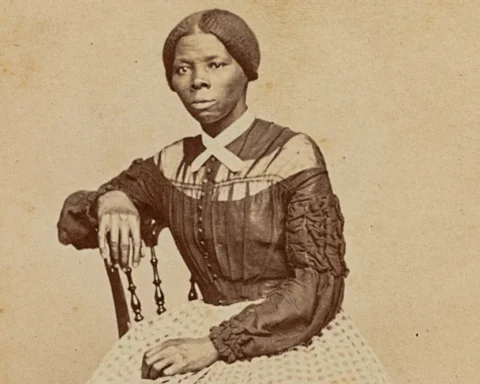By Joe Heim and Lori Rozsa
“To just give children some sanitized, watered-down version of history that doesn’t address the historical context and the truth doesn’t work,” said Amani, who is also executive director of the Southern Birth Justice Network, which advocates for Black maternal health. That’s “not at all what I want for my children,” she said.
In many parts of the country, Black educators say they have to be extra careful, concerned that material they present will make students or their parents uncomfortable or that a colleague or community member will be offended. They worry that assigning the wrong book or having an out-of-context comment captured on video could land them in hot water — or out of a job.
Last year, as part of a professional development effort, faculty members were assigned to read “Why Are All the Black Kids Sitting Together in the Cafeteria?,” a book that explores the psychology of racism and offers a framework for talking about race. Cayson said the effort fell apart when many teachers didn’t read the book and minority teachers were offended by comments on the book sent in by their White colleagues.
Republican Georgia legislators are seeking to pass a bill that would limit how educators teach about racism and history. It says Americans should be allowed “an aspirational and inspirational take on America’s history, debunking the misguided argument that the present-day problems of black Americans are caused by the injustices of past failures, such as slavery.” And earlier this year Georgia Gov. Brian Kemp (R) vowed to “protect our students from divisive ideologies like critical race theory that pits kids against each other.”
But educators and others say critical race theory, a decades-old legal framework that says racism is systemic in the United States, isn’t taught in schools, and they’ve argued that attempts to ban it in Georgia and elsewhere are simply intended to get rid of diversity initiatives in teaching and restrict lessons that explore America’s darker history.
The political battle, Cayson said, is being felt in the classroom.
“You do have a lot of teachers who are fearful of what’s going on,” Cayson said, adding, “I never imagined that we would be getting back to censorship in this country, and it’s frustrating to me.”
The impact of similar legislation is affecting history teachers across the country. Chanda Robinson, a South Carolina educator and a member of the National Council for the Social Studies board, said history and social studies teachers are worried that anything they might say could get them in trouble, because many of the new laws and guidelines are so vague. She has told teachers to teach to the state standard and to ensure that their lesson plans are district-approved.
Angela Burley, a history teacher in Dallas, said that the mood is “solemn” for Black history and social studies teachers in Texas. She thinks many of them are uncomfortable teaching in schools that are not predominantly Black, she said, because of the scrutiny they are facing.
“I’m not going to chance and gamble my certification to teach somewhere where I have to be worried about every single word that comes out of my mouth,” Burley said.
Burley, who has been teaching for 22 years, moved in 2020 from a high school where she was one of two Black teachers to a middle school where most of the faculty is Black. She describes the new environment as a “soothing balm” in which she’s allowed to teach knowing she has the support of her colleagues and administration.
“I think that raised the scrutiny on teachers, you know, put more of a microscope on us, particularly social studies or history teachers, or particularly those of us who are African American who, like myself, may have a reputation for being a Black history teacher who incorporates Black history into their content,” Pierce said.
But even with the added scrutiny, Pierce said he won’t shy away from teaching a history of America that includes what Black Americans have had to endure, as well as how they’ve advocated for themselves and succeeded against the odds.
Students, too, are voicing their frustrations with what they see is being endangered by proposed legislation and guidance.
Jade Thompson, 16, attends Florida Virtual School, the state’s online option. The curriculum is the same as the curriculum at in-person schools. She said students can handle diversity and the critical thinking she believes legislators are trying to ban. When she was still attending in-school classes, Thompson said, students of different races would discuss the tough issues outside the classroom, and nobody’s feelings were hurt.
The eagerness of students to learn and discuss difficult history has long been apparent to Myron Curtis, a teacher and the head football coach at Broad Run High School in Loudoun County, Va. When the school held its curriculum day in early February to allow students to sample courses, Curtis’s African history and diaspora classroom was full — three separate times.
Interest in the elective was enthusiastic and crossed racial and ethnic lines, said Curtis, who is Black and has been teaching for 11 years.
But Curtis also knows there has been blowback across the country against history courses, especially Black history courses, that teach America’s failures and inequities alongside its achievements. His school district of 81,000 students landed at the center of those debates when a parent group targeted Loudoun schools for initiatives that included bias training for teachers and a public apology for segregation.
The parents, through a group called Fight for Schools, alleged that the school district’s efforts to address a history of racism are evidence that it is implementing critical race theory. Loudoun schools deny those accusations.
Curtis said he has the strong support of his school administration, but he half-joked with the students on curriculum day that they should take his class because it could end up being banned at some point.
“It’d be kind of cool to say you took a banned course,” he told them.
Even in states where there hasn’t been as much pushback, Black teachers are angry about what they see as retrenchment when it comes to exploring essential issues of racism and equity in American history. And they think there is a fundamental misunderstanding of what is and isn’t taught by teachers in class.
“Right now there’s so much influence from the outside about what happens in classrooms,” said Krystal Davis, a Black high school teacher in a suburban Chicago district. “What teachers do every day, they don’t get it. They really think that we’re out there teaching kids like: ‘White people were bad. Black people are great. And White people mistreated Black people forever.’ … They really think that if you say ‘I’m teaching Black history,’ then that wipes out all of their history.”
For Charice Rosser, a parent of a middle school student in rural North Carolina, the push in some states for schools to avoid teaching about anything other than American exceptionalism is yet one more snub for Black Americans.
“Everybody’s truth has been told, and ours has just been hushed,” Rosser said. She likened ignoring the modern-day effects of slavery and racism to ignoring dark family secrets.
“This may sound a little graphic, but it’s sort of like having a family molester in the family and you don’t say anything,” she said, “because you don’t know how people are going to respond.”
By teaching the full scope of Black American history, including successes and accomplishments but also slavery, Jim Crow and ongoing racism, all students will benefit from a better grasp of how we got to where we are, she said.
“Can we acknowledge the fact that the people that are descendants of this situation are still being impacted?” she said. “What we can we do as a noble and humane thing in society is to at least create stability for the next generation.”





